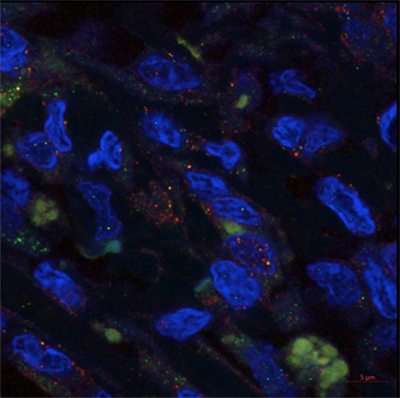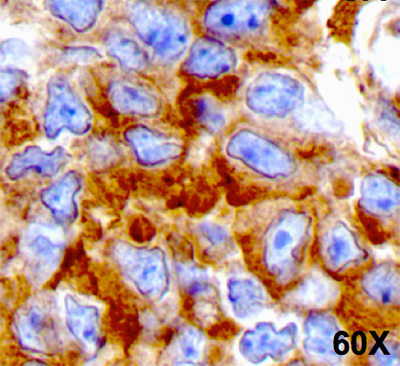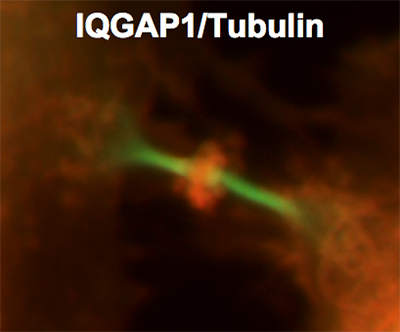Mahasin Osman, Msc. Ph.D. — Major Research Interests
Research in the Osman lab is both basic mechanistic and translational, focused on
the mechanisms governing cell homeostasis and their dysfunction in human disease.
Using well-established and new technology the Osman lab investigates signaling networks
that underlie complex diseases, and aims at identifying biomarkers and drug targets.
Four main projects are being pursued to define how a newly identified pathway modulates
cell proliferation and apoptosis; links cancer and diabetes and how it mediates cancer
development.
Research Statement
|
|
Project 1: Pharmaco-genetic analyses of Endocrine-resistant Cancers:
Triple negative Breast cancer is a group of heterogeneous mammary gland cancers defined by lack of overexpression of hormone and growth factor receptors. As such TNBC lacks diagnostic and therapeutic targets and remains lethal, particularly for women from minority or economically disadvantaged populations. Our research has identified 2 distinct pathways with promise of providing selective markers and drug targets. Because, the same pathways appear to affect prostate cancer; comparative studies are underway to determine efficacy/pathway of identified small molecule regulators on both diseases
Project 2: Gastric cancer:
Using a combination of molecular, cellular analyses and patient-derived tissues to define how IQGAP1 promotes gastric cancer. We identified two distinct pathways that normally regulate one another and being hijacked by the tumors in a mutually exclusive manner
Project 3: The link between cancer and diabetes:
It has recently been recognized that Type 2 diabetes predisposes to several types of cancers, including breast cancers. Our lab has identified a possible mechanism that links these two metabolic diseases.
Project 4: Regulation of cell Proliferation:
IQGAP1 is a signaling scaffold protein that acts as a rheostat to modulate apoptosis and cell proliferation and is associated with several human cancers. Our research revealed that different mutants of IQGAP1 promote cell proliferation or apoptosis via different pathways. We are using molecular, cellular and pharmacological assays to elucidate these pathways.
Funded Research
2017- The World Bank, Wellcome Trust, African Centres of Excellence (ACE) in Higher Education Project to WACCBIP –PhD thesis research in my lab (Emmanuel Tagoe)
2004- no-cost extension until 2009 CA104285-03: NIH, NCI, (PI) Roles for IQGAP1 in Polarity and Cytokinesis. (~$500,000)
2003-2004 American Cancer Society (PI): Roles for IQGAP1 in cytokinesis and trafficking ($20,000 direct)
2007-2009 American Society for Cell Biology Visiting Professors Awards (PI) Roles for IQGAP1 in ER-Golgi trafficking in epithelial cells ($40,000 direct)
2003-2008 Hunter R. Rawlings III Presidential Research Scholar, Cornell University, (Mentor) awarded for outstanding undergraduate student proposals conducting research in my laboratory ($20,000 direct).
2003-2008 Cornell Tradition Scholarships Program, (Mentor) awarded for outstanding proposals by undergraduate student conducting research in my laboratory.
Scholarly Work
Scholarly Publications in National Journals (edited non-peer reviewed):
Osman MA and Aktas RG (2014). Diabetes, Cancer, and Their Connection. IAC’s Second Turkey Meeting Addresses Regional Health Concerns. American Society for Cell Biology Newsletter, 37: 18-20.
Osman, M. A. (2012). ASCB Launches Its Turkey Initiative with a Microscopy Course in Istanbul American society for Cell Biology Newsletter 35 (no 10): 24-26.
Osman, M. A. (1996). Basic Science and the Future of Scientific Development in Africa. Cornell University Africa Notes
Osman, M. A. (1999). Biotechnology and Scientific Research in Africa. Cornell University Africa Notes
Workshop Organization:
2014 Frontiers in Medical Sciences: Cancer, Diabetes and their Connection, an ASCB-IAC and Maltepe University conference, Istanbul, Turkey June 6-8, 2014. Designed the conference, recruited the faculty and biotech companies http://fims.maltepe.edu.tr/
2014 Modern Cell Biology in Research and Disease: A training course at the Faculty of Science-Medical School, University of Khartoum (UofK), Sudan (February 2014), organized and taught the course, funded by the United Nation Development Program (UNDP) and the UofK
2012 Fundamentals and Applications of Fluorescence Microscopy (FAFM) in Modern Cell Biology at Koc University, Istanbul, Turkey (http://fafm.ku.edu.tr; August 11-17, 2012). Designed the course material, recruited faculty and biotech companies, selected students, taught and evaluated the course for improvement of this annually ongoing course
2012 Modern Cell Biology in Research and Disease: A training course at the Faculty of Science-Medical School, University of Khartoum (UofK), Sudan (January 16-February 1 2012), organized and taught the course, funded by the United Nation Development Program (UNDP) and the UofK.
2011 Learning and Teaching Modern Cell Biology: a route to successful biomedical research. July 4-15, 2011, College of Health Sciences, Kwame Nkrumah. University of Science and Technology (KNUST), Kumasi, Ghana. Designed and taught three modules composed of lectures, lab-practical, and journal clubs in 1- Membrane Traffic. 2-Regulation of Eukaryotic Gene Expression and 3- Oncogenesis and Tumor Suppressors, Cell Biology and Disease. Funded by Carnegie Foundation under the auspices of the American Society for Cell Biology (ASCB)
2009 International Teaching Faculty in Cell Biology, The Cell Biology of Protozoan Pathogens. First West African Regional Workshop, JULY 13-24, 2009, University of Ghana, Legon, Accra. Funded by Carnegie Foundation and Olympus under the auspices of the ASCB
2008 International Teaching and Organizing Faculty, East African Regional Training workshop. July 2008. Sokoine University of Agriculture, Morogoro, Tanzania. Funded by Carnegie Foundation under the auspices of the ASCB
Invited Seminars:
- Armstrong University (Georgia Southern University), Department of Biology, “How we Study Cancer at the Cellalar Level and Why that is Important?”. February 15, 2017
- Augusta University Medical College, Cardiovascular Biology Center. A Pathway at the Interface of Cancer and Diabetes. October 5th, 2016, Augusta, GA
- Louisiana Cancer Research Consortium, College of Pharmacy, Xavier University’s RCMI Grant. NIH Grant Number #2G12MD007595 from the National Institute on Minority Health and Health Disparities. The link between cancer and diabetes: Role of a molecular rheostat? April 26, 2016, New Orleans, LA
- Maltepe University Medical School, Istanbul, Turkey. Role of signal dynamics in the link between type 2 diabetes and cancer. July 7 2014. FIMS Conference [http://fims.maltepe.edu.tr/about-the-meeting
- Brown University Medical School, Department of Pediatrics, Women and Infants Hospital, Providence RI USA. IQGAP1 in the Molecular link between cancer and diabetes, May 20th 2014
- The University of Southern Illinois, Cancer Center, Springfield, Illinois, USA. Role of IQGAP1 in the molecular link between cancer and diabetes, April 25 2014.
- Koc University Medical School, Istanbul, Turkey: A unique signaling pathway that couples cancer to metabolic syndrome. August 16 2012
- Wayne State University, School of Medicine, Department of Pathology, Detroit, Michigan, USA. A novel signaling pathway at the interface of Cancer and Diabetes. May 16, 2012
- Brown University Medical School, Rhode Island Hospital, Department of Orthopedic Research, Division of Molecular and cellular Biology, Providence RI, USA. A Novel Signaling Pathway Regulating the Coupling of Cell Growth and Division. March 31, 2010.
- SUNY Medical School at Buffalo. Department of Physiology and Biophysics, Buffalo, USA. Signaling Pathways Controlling Cell Proliferation: Regulation by IQGAP1. September 4, 2009.
- Brown University. Department of Molecular Pharmacology, Physiology and Biotechnology, Division of Biology and Medicine, Providence, RI, USA. Does IQGAP1 Function as a Molecular Sensor for Cell Growth and Division? March. 2006.
National and International Service:
- Scientist: United Nations Development Programme (UNDP)- Transfer of Knowledge Through Expatriate Nationals (TOKTEN). Invited to create programs in genetics and cell biology at the University of Khartoum and hold training courses. Invited to help with reorganizing and creating new life sciences departments
- Lead, the ASCB-IAC Turkey Initiative beginning with a workshop at Koc University School of Medicine, Istanbul, to develop educational/research programs in modern cell biology and foster collaborations between US-Turkey scientists
- Founding Member, the American Society for Cell Biology, International Affairs Committee (ASCB/IAC) Developing and teaching cell biology summer courses through the ASCB-IAC in Sub-Saharan African Countries funded by Carnegie Foundation, Alternating between East and West Africa (Tanzania-Ghana)
- Editorial sub-committee, IAC ACSB-Newsletter. Report and commission reports on world cell biology in different institutions
- Poster judge, training workshops and mentoring sessions for postdocts, graduate, undergraduate and students participants of the Minorities Affairs Committees (MAC) of the ASCB and the American Association for Cancer Research, AACR-MICR, during annual meetings 2007-Present
University, State, and Other Service:
- Program Planning Committee for the 2018 Conference, Georgia Association for Women in Higher Education (GAWHE) Leadership -American Council on Education (ACE)
- Fund Raising for Cancer Research and Cure, The Susan G. Komen Foundation, Coastal Georgia, Formed “Team Osman Lab”, recruited members, raised funds and won matching funds. Participated in the 5K Race for the Cure, Ellis Square, Savannah, GA, April 22nd 2017,
- Judge, Biology Scientific Sessions, Savannah State University 7th Annual Research Conference, April 11th 2017
- Panel Moderator (2017), Molecular and Cellular Biology, The Peach State Louis Stokes Alliance for Minority Participation (PS-LSAMP) Conference February 2-4, 2017
- Poster Judge (2017), Molecular and Cellular Biology, PS-LSAMP Conference February 2-4, 2017
- Cornell Mosaic Committee: Primary mission is to promote the involvement of diverse alumni organizations and individuals in Cornell programs and volunteer activities; to represent the interests of Cornell University's diverse constituencies and to support development efforts by Cornell's diverse alumni by identifying opportunities to influence University priorities, supporting and promoting diversity initiatives, and collaborating with the larger Cornell University community.
- Discussion leader (Panel Moderator), Cornell Undergraduate Book Project; an annual freshman reading project at Cornell University.
- Director, Cell Signaling Journal Club, Molecular Medicine, Cornell University





